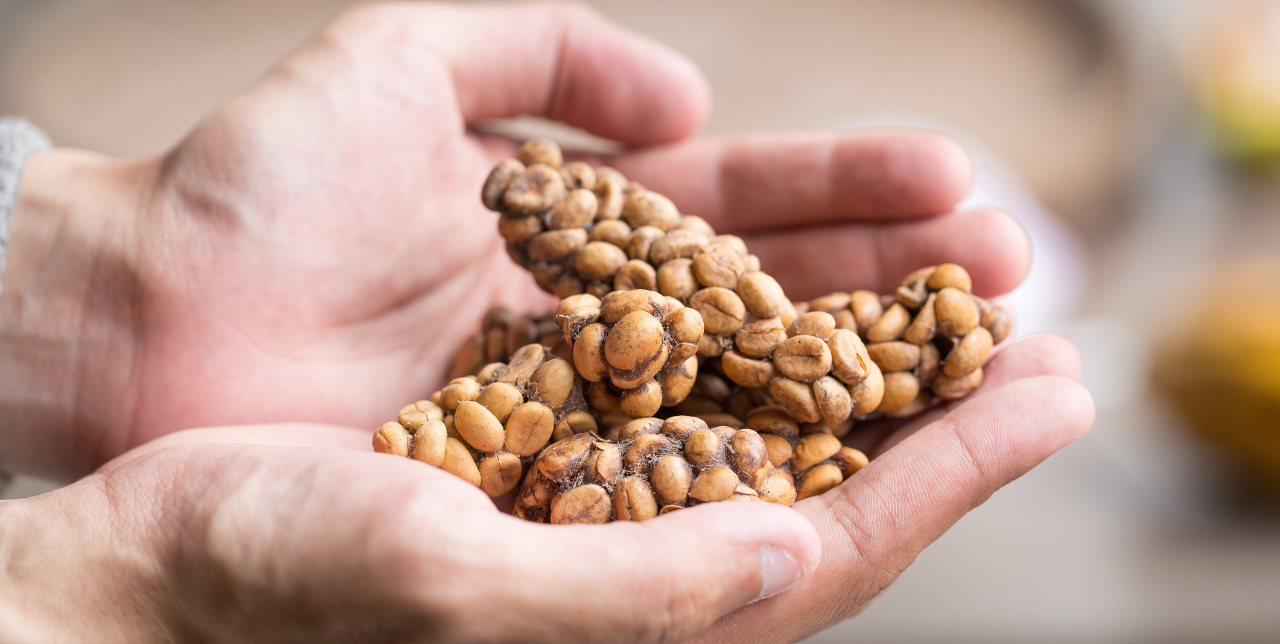Kopi Luwak, often referred to as the world’s most expensive coffee, owes its uniqueness and luxury status not just to its exotic production process but also to the intricate chemistry involved. Understanding the chemistry of Kopi Luwak reveals why this coffee stands apart from conventional processed coffee grains. This exploration offers insight into the chemical transformation that Kopi Luwak undergoes, from ingestion by the Asian palm civet to the final brew, highlighting the distinct differences that contribute to its exceptional flavor profile.
The Unique Production Process of Kopi Luwak
Kopi Luwak’s journey begins with the Asian palm civet, which selects and consumes ripe coffee cherries. The coffee beans, encased in these cherries, undergo a natural fermentation process in the civet’s digestive tract, where a combination of stomach acids and enzymes chemically alters the beans. After passing through the civet, the beans are collected, cleaned, and roasted to create a coffee that boasts a remarkably smooth flavor, devoid of the bitterness often found in other coffees.
The Chemistry Behind the Magic
The magic of Kopi Luwak lies in its unique fermentation process. The chemistry of Kopi Luwak is marked by several key factors:
- Enzymatic Breakdown: In the civet’s stomach, enzymes break down the proteins in the coffee beans. This breakdown is crucial because it leads to a reduction in bitterness and the creation of unique amino acids that contribute to the coffee’s flavor profile.
- Acidic Influence: The acidic environment of the civet’s digestive system further alters the chemical structure of the coffee beans. This alteration impacts the beans’ final taste, making it smoother and less acidic than conventionally processed coffee.
- Maillard Reaction: Upon roasting, Kopi Luwak beans undergo the Maillard reaction—a chemical reaction between amino acids and reducing sugars that gives browned foods their distinctive flavor. Thanks to the pre-digestive processes, Kopi Luwak beans experience this reaction differently, leading to a unique flavor profile that cannot be replicated in other coffee beans.
Differences from Other Processed Coffee Grains
The chemistry of Kopi Luwak not only defines its unique taste but also sets it apart from other processed coffee grains in several ways:
- Reduced Bitterness: The enzymatic breakdown of proteins in Kopi Luwak beans reduces bitterness, a stark contrast to the sharp taste found in some traditionally processed coffees.
- Enhanced Flavor Profile: The unique combination of amino acids produced during the civet’s digestion process contributes to a richer and more complex flavor profile in Kopi Luwak.
- Lower Acidity: The natural fermentation process in the civet’s stomach leads to coffee that is smoother and has lower acidity, making it more palatable for those sensitive to acidic foods.
Ethical Considerations and Sustainability
While the chemistry of Kopi Luwak contributes to its allure, it’s essential to consider the ethical implications of its production. The demand for Kopi Luwak has led to the caging of wild civets and unsustainable farming practices. Ethical sourcing and the welfare of civets are crucial aspects that consumers need to consider. Supporting producers who ensure the humane treatment of civets and adhere to sustainable practices is vital for the future of Kopi Luwak.
Exploring Further
For those interested in delving deeper into the science and ethics behind Kopi Luwak, numerous resources offer extensive information. Websites such as the Specialty Coffee Association provide detailed analyses of coffee chemistry, while organizations like World Wildlife Fund offer insights into sustainable and ethical coffee production practices.
The chemistry of Kopi Luwak is a fascinating subject that combines science, ethics, and gastronomy. This unique coffee offers a taste experience unmatched by conventional coffees, thanks to its distinctive chemical composition. As we continue to explore and understand the complexities behind Kopi Luwak, it’s crucial to balance our curiosity and desire for unique flavors with the imperative of ethical and sustainable consumption practices.

